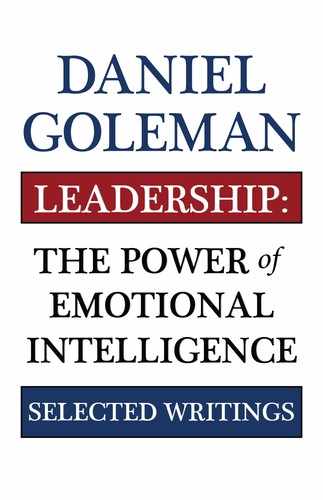WHAT MAKES A LEADER?
Adapted from The Harvard Business Review
Every businessperson knows a story about a highly intelligent, highly skilled executive who was promoted into a leadership position only to fail at the job. And they also know a story about someone with solid – but not extraordinary – intellectual abilities and technical skills who was promoted into a similar position and then soared. Such anecdotes support the widespread belief that identifying individuals with the “right stuff” to be leaders is more art than science. After all, the personal styles of superb leaders vary: Some leaders are subdued and analytical; others shout their manifestos from the mountaintops. And just as important, different situations call for different types of leadership. Most mergers need a sensitive negotiator at the helm, whereas many turnarounds require a more forceful authority. I have found, however, that the most effective leaders are alike in one crucial way: they all have a high degree of what has come to be known as emotional intelligence.
It’s not that IQ and technical skills are irrelevant. They do matter, but mainly as “threshold capabilities”; that is, they are the entry-level requirements for executive positions. But my research, along with other recent studies, strongly suggests that emotional intelligence is the sine qua non of leadership. Without it, a person can have the best training in the world, an incisive, analytical mind, and an endless supply of smart ideas, but he still won’t make a great leader. My colleagues and I have focused on how emotional intelligence operates at work. We have examined the relationship between emotional intelligence and effective performance, especially in leaders. And we have observed how emotional intelligence shows itself on the job. How can you tell if someone has high emotional intelligence, for example, and how can you recognize it in yourself? In the following pages, we’ll explore these questions, taking each of the components of emotional intelligence – self-awareness, self-regulation, empathy, and social skill – in turn.
Most large companies today have employed trained psychologists to develop what are known as “competency models” to aid them in identifying, training, and promoting likely stars in the leadership firmament. The psychologists have also developed such models for lower-level positions. While writing Working With Emotional Intelligence, I analyzed competency models from 188 companies, most of which were large and global, as well as government agencies. In carrying out this work, my objective was to determine which personal capabilities drove outstanding performance within these organizations, and to what degree they did so. I grouped capabilities into three categories: purely technical skills like accounting and business planning; cognitive abilities like analytical reasoning; and competencies demonstrating emotional intelligence, such as the ability to work with others and effectiveness in leading change. To create some of the competency models, psychologists asked senior managers at the companies to identify the capabilities that typified the organization’s most outstanding leaders. To create other models, the psychologists used objective criteria, such as a division’s profitability, to differentiate the star performers at senior levels within their organizations from the average ones. Those individuals were then extensively interviewed and tested, and their capabilities were compared. This process resulted in the creation of lists of ingredients for highly effective leaders. The lists ranged in length from 7 to 15 items and included such ingredients as initiative and strategic vision. Some of the competencies reflected purely cognitive, IQ-type abilities, or purely technical skills, while others were based largely on emotional intelligence abilities like self-management.
When I analyzed all this data, I found dramatic results. To be sure, intellect was a driver of outstanding performance. Cognitive skills such as big-picture thinking and long-term vision were particularly important. But when I calculated the ratio of technical skills and IQ to emotional intelligence as ingredients of excellent performance, emotional intelligence proved to be twice as important as the others for jobs at all levels. Moreover, my analysis showed that emotional intelligence played an increasingly important role at the highest levels of the company, where differences in technical skills were of negligible importance.
In other words, the higher the rank of a person considered to be a star performer, the more emotional intelligence capabilities showed up as the reason for his or her effectiveness. When I compared star performers with average ones in senior leadership positions, nearly 90 percent of the competencies that distinguished outstanding performers was attributable to emotional intelligence factors rather than purely cognitive abilities. Other researchers have confirmed that emotional intelligence not only distinguishes outstanding leaders but can also be linked to strong performance.
The findings of the late David McClelland, the renowned researcher in human and organizational behavior, are a good example. In a 1996 study of a global food and beverage company, McClelland found that when senior managers had a critical mass of emotional intelligence capabilities, their divisions outperformed yearly earnings goals by 20 percent. Meanwhile, division leaders without that critical mass underperformed by almost the same amount. McClelland’s findings, interestingly, held as true in the company’s U.S. divisions as in its divisions in Asia and Europe. In short, the numbers tell us a persuasive story about the link between a company’s success and the emotional intelligence of its leaders. And just as important, research is also demonstrating that people can, if they take the right approach, develop their emotional intelligence.
